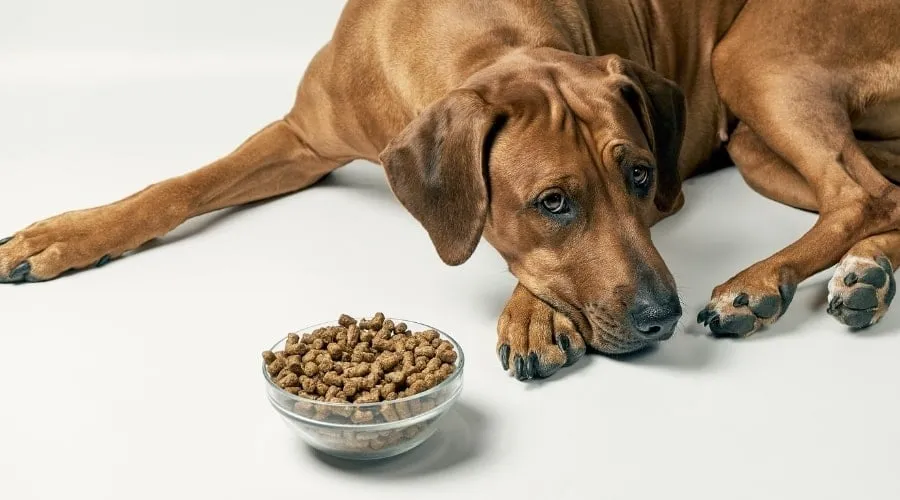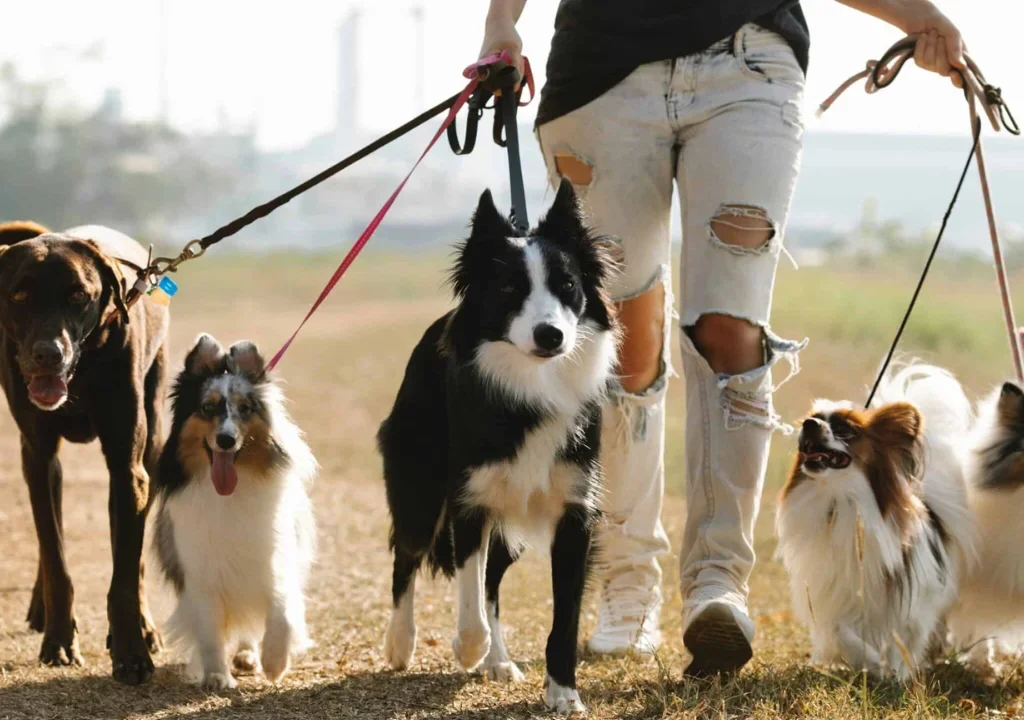
Finding the perfect dog food for Rhodesian Ridgebacks isn’t just about filling their bowl. These magnificent “African Lion Hounds” have unique nutritional needs that directly impact their energy levels, joint health, and overall well-being.
Your Rhodesian Ridgeback deserves nutrition that matches their regal heritage and athletic nature. The wrong diet can lead to joint problems, digestive issues, and energy crashes that rob your dog of their natural vitality.
This comprehensive guide reveals the top dog food choices for Rhodesian Ridgebacks, backed by 2025 veterinary research and expert recommendations.
Understanding Your Rhodesian Ridgeback’s Unique Nutritional Needs
Rhodesian Ridgebacks are large, athletic dogs with specific dietary requirements. These powerful hounds typically weigh between 70-85 pounds and possess boundless energy that demands proper fuel.
Key Nutritional Requirements
High-Quality Protein (22-26% minimum): Recent 2025 studies show that active Rhodesian Ridgebacks thrive on diets containing 34% minimum protein, supporting their lean muscle mass and athletic performance.
Joint Support Ingredients: Large breed dogs benefit significantly from glucosamine and chondroitin, which protect cartilage and support joint health. This is crucial since 20% of dogs over 1 year of age suffer from joint problems.
Controlled Calcium and Phosphorus: Large breed puppies need carefully balanced minerals to prevent developmental orthopedic diseases.
Omega-3 Fatty Acids: Essential for coat health, brain function, and reducing inflammation.
Top 7 Best Dog Food for Rhodesian Ridgebacks in 2025
1. Taste of the Wild High Prairie Grain-Free
Why It’s Perfect: This formula tops 2025 reviews for Rhodesian Ridgebacks due to its high-quality ingredients and excellent value.
Key Features:
- Real buffalo as the first ingredient
- 32% protein content
- Grain-free formula reduces allergies
- Contains probiotics for digestive health
- Rich in antioxidants from fruits and vegetables
2. Diamond Naturals Large Breed Adult
Why It Works: Specifically formulated for large breeds with optimal protein-to-fat ratios.
Key Features:
- Chicken and rice formula
- Glucosamine and chondroitin for joint support
- Omega fatty acids for skin and coat
- No corn, wheat, or artificial preservatives
3. Eukanuba Large Breed Adult
Why It’s Recommended: Scientifically formulated to meet large breed nutritional needs.
Key Features:
- 23% protein, 13% fat ratio
- 3D DentaDefense system for dental health
- Optimal calcium and phosphorus levels
- Enhanced with vitamins and minerals
4. Purina Pro Plan Large Breed Formula
Why It’s Trusted: Veterinarian-recommended with extensive research backing.
Key Features:
- Real chicken as #1 ingredient
- Glucosamine for joint health
- High digestibility
- Fortified with probiotics
5. Blue Buffalo Life Protection Large Breed
Why It’s Popular: Contains omega-3 fatty acids and vitamin E that reduce joint inflammation.
Key Features:
- LifeSource Bits with antioxidants
- No chicken by-products or artificial preservatives
- Deboned chicken and brown rice
- Enhanced with fruits and vegetables
6. Hill’s Science Diet Large Breed Adult
Why It’s Effective: Clinically proven nutrition for large breed health.
Key Features:
- Balanced minerals for bone and joint health
- Easy-to-digest ingredients
- Natural fiber for healthy digestion
- Antioxidants for immune support
7. Royal Canin Large Breed Adult
Why It’s Specialized: Breed-size specific nutrition with precise kibble size.
Key Features:
- Adapted protein content (23%)
- Glucosamine and chondroitin
- EPA and DHA for skin health
- Digestive health support
Special Considerations for Rhodesian Ridgeback Puppies
Large Breed Puppy Food for Rhodesian Ridgebacks
Rhodesian Ridgeback puppies need specialized nutrition to support healthy growth without excessive rapid development.
Recommended Puppy Foods:
- Hill’s Science Diet Large Breed Puppy: Controlled calcium for proper bone development
- Advance Large Breed Puppy: Optimal protein and fat ratios
- Royal Canin Large Puppy: Breed-size specific nutrition
Feeding Guidelines:
- Feed puppy food until 12-18 months old
- For puppies 2-3 months weighing under 5kg: up to 100 grams daily
- Puppies 5-10kg: 80-170 grams daily
- Monitor growth rate to prevent rapid development
Puppy Feeding Schedule
8-12 weeks: 4 meals per day 3-6 months: 3 meals per day 6-12 months: 2 meals per day 12+ months: 1-2 meals per day
Raw Diet Options for Rhodesian Ridgebacks
Benefits of Raw Feeding
Raw diets provide nutritionally balanced nutrition according to life stage and energy needs, including high-quality proteins, healthy fats, vitamins, minerals, and fiber.
Raw Diet Advantages:
- Improved digestion
- Healthier skin and coat
- Better dental health
- Enhanced energy levels
- Reduced allergies
Raw Diet Components
Protein Sources (80%):
- Beef, chicken, lamb, fish
- Organ meats (liver, kidney, heart)
Bones (10%):
- Raw meaty bones for calcium
- Never cooked bones
Vegetables and Fruits (10%):
- Leafy greens, carrots, apples
- Avoid grapes, onions, garlic
What to Avoid in Dog Food for Rhodesian Ridgebacks
Harmful Ingredients
Avoid These Common Fillers:
- Corn, wheat, soy
- By-products and meals
- Artificial colors and preservatives
- Excessive peas and legumes
- Generic “meat” without specification
Potential Health Risks
Bloat Prevention: Feed smaller, frequent meals to prevent gastric torsion Weight Management: Maintain lean body condition to reduce joint stress Allergies: Monitor for food sensitivities and rotate proteins if needed
Read more about: Maev Dog Food Review: Is This $200+ Raw Food Worth Your Money in 2025?
Age-Specific Feeding Guidelines for Rhodesian Ridgebacks
Adult Dogs (1-7 years)
Daily Feeding Amount: 4-6 cups divided into 2 meals Protein Requirements: 22-26% minimum Fat Content: 12-15% Focus: Maintaining lean muscle and joint health
Senior Dogs (7+ years)
Daily Feeding Amount: 3-5 cups (may decrease with activity) Protein Requirements: 18-25% (higher quality, easier to digest) Special Needs: Enhanced joint support, digestive aids Focus: Managing arthritis and maintaining quality of life
Signs Your Rhodesian Ridgeback Needs a Diet Change
Positive Health Indicators
Good Nutrition Signs:
- Shiny, thick coat
- Clear, bright eyes
- High energy levels
- Healthy weight
- Good muscle tone
- Regular, firm stools
Warning Signs
Diet Change Needed:
- Dull, dry coat
- Excessive scratching
- Low energy or lethargy
- Weight gain or loss
- Digestive issues
- Joint stiffness
Expert Feeding Tips for Rhodesian Ridgebacks
Portion Control
Weight Management: Calorie-restricted diets reduce disease risk and can extend life by up to two years.
Feeding Method:
- Measure portions accurately
- Use puzzle feeders to slow eating
- Avoid free feeding
- Monitor body condition regularly
Supplement Considerations
Joint Health: Large breed dogs over 60 pounds benefit from targeted joint supplements.
Recommended Supplements:
- Glucosamine and chondroitin
- Omega-3 fish oil
- Probiotics for digestive health
- Vitamin E for antioxidant support
Hydration Importance
Water Requirements:
- Fresh water available 24/7
- 1 ounce per pound of body weight daily
- Increased needs during hot weather or exercise
- Monitor for changes in drinking habits
Also read: Probiotic Chews for Dogs: The Ultimate Guide to Improving Your Pet’s Digestive Health in 2025
Transitioning to New Dog Food for Rhodesian Ridgebacks
Gradual Transition Process
Week 1: 75% old food, 25% new food Week 2: 50% old food, 50% new food
Week 3: 25% old food, 75% new food Week 4: 100% new food
Monitoring During Transition
Watch For:
- Digestive upset
- Changes in appetite
- Stool consistency
- Energy levels
- Skin and coat changes
Cost Considerations and Budget-Friendly Options
Premium vs. Budget Foods
Investment in Quality:
- Higher-quality foods often provide better nutrition per serving
- May reduce veterinary costs long-term
- Better digestibility means less waste
Budget-Friendly Options:
- Diamond Naturals (excellent value)
- Purina Pro Plan (widely available)
- Costco Kirkland (surprising quality for price)
Conclusion: Choosing the Best Dog Food for Rhodesian Ridgebacks
Selecting the right dog food for Rhodesian Ridgebacks requires balancing quality nutrition with your dog’s individual needs. These magnificent hounds thrive on high-protein diets with joint support ingredients and controlled mineral content.
Remember that the best dog food for Rhodesian Ridgebacks is one that maintains their lean physique, supports their active lifestyle, and promotes long-term health. Whether you choose premium kibble, raw feeding, or a combination approach, consistency and quality should be your top priorities.
Monitor your Ridgeback’s response to their diet and be prepared to make adjustments as they age or their activity level changes. With proper nutrition, your loyal companion will maintain their strength, energy, and regal bearing throughout their life.
Frequently Asked Questions
About the Author:
Hi, I’m Emilia! I’ve been passionate about sharing valuable pet care insights for over 10 years, and I love helping fellow pet owners provide the best care for their furry companions. My goal is to make pet care information accessible and helpful for everyone. Please remember to always consult your veterinarian before implementing any health advice or treatments for your pet.

